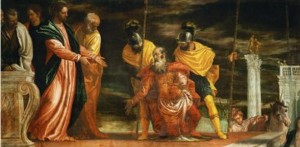Jeremiah 29:1, 4-7
This text is used for the Lectionary Year C on October 9th, 2016.
 This sermon series began last week in Lamentations 1:1-6 and ends in a few weeks in Joel 2:23-32. This allows the pastor the opportunity to trace the arc of redemption as told through Israel’s story with God. This is the foundation of Christ’s coming, through which this story finds its fruition and fulfillment. Such a sermon series allows a congregation to re-engage the movement of their own life with God, starting in Lamentations with disorientation over their own sin and its consequences. This confrontation with sin is necessary if a congregation is to engage in the faithful application of hope toward Joel’s vision of life and land indwelled with the presence of the Spirit.
This sermon series began last week in Lamentations 1:1-6 and ends in a few weeks in Joel 2:23-32. This allows the pastor the opportunity to trace the arc of redemption as told through Israel’s story with God. This is the foundation of Christ’s coming, through which this story finds its fruition and fulfillment. Such a sermon series allows a congregation to re-engage the movement of their own life with God, starting in Lamentations with disorientation over their own sin and its consequences. This confrontation with sin is necessary if a congregation is to engage in the faithful application of hope toward Joel’s vision of life and land indwelled with the presence of the Spirit.
Therefore, this sermon moves with Israel deeper into the anguish of exile that Jeremiah describes, and initiates anew for God’s people the foundational posture of life with God – hope and faith. Hope and faith are the posture of God’s people that propel them into a world that lacks, a world whose reality remains a pale vision of God’s covenant promises. Jeremiah began his prophetic career at the end of the seventh century, at the close of Assyria’s reign, and he prophesied through the Babylonian conflict and the subsequent exile of God’s people. Although Jeremiah consistently warns of doom for Israel at the hands of Babylon, his book is primarily about hope, the hope of Israel’s restoration. This theme is explained as Jeremiah communicates that Israel’s God is in charge of creation and is eternally faithful to God’s own promises.



